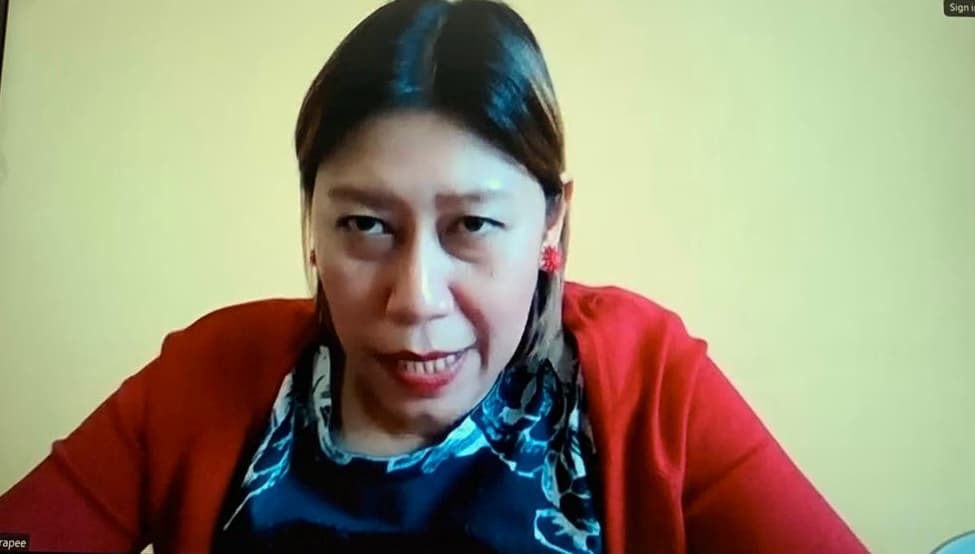Starting Point
Ms. Wanraphee is currently serving as the Head of the Security Policy and Strategic Division, the Ministry of Justice. She has been appointed as one of the members of the technical team/desk of the Thai government’s delegate in the Southern Thailand peace dialogue since 2015. Her long-time interest is in rights and justice. She holds BA and MA in Law from Thammasat University.
Before joining the peace delegate team, her duties as a senior official at the Ministry were about investigating complaint cases on violations and crime suppression. She describes her works there as a kind of ‘reactive’ work, demanding her to fix issues when they become explicit. With her role as one of the members of the official technical team from the Thai state, she needs ‘to be more proactive and optimistic’. As an action-oriented person, Ms. Wanraphee does not settle for just having a verbal commitment both from herself and people around her when it comes to work. She needs to see those verbal commitments being translated into a concrete plan with clear steps for implementation.
Peace Journey
Although the formal peace dialogue for Thailand’s Unrest was initiated in 2013, Ms. Wanraphee started her work in the technical support team/desk of the Thai delegate side in 2015 when MARA PATANI, an umbrella entity, was set up by Malay-Muslim insurgent groups, to officially represent themselves. However, in most people’s perception, the technical support team/desk only takes care of some trivial issues or some ‘housekeeping’ tasks like setting up a meeting venue, facilitating travels, and preparing documents. But the technical team/desk plays far more important and indispensable roles. In her view, the technical team serves as a vital feature of peace dialogue. The team gathers, selects, and proposes issues for the secretariat team to review and pick for discussion and negotiation.
During the first few years of her engagement, she and the technical support team's tasks were to coordinate with the representatives of the other side and the Malaysian facilitator, making sure that the dialogue would take place and the other side had a clear understanding of issues the Thai state proposed for discussion and negotiation. Representing the Thai state, Wanraphee, the only female member of the desk, needs to get a clear understanding of the Thai state’s viewpoints and stands regarding the conflict and security matters for the southernmost region and the whole nation before she can give an appropriate response to questions and concerns raised by the other side.
Ms. Wanraphee has never sat at the formal negotiation table reserved for some high-level Thai state officials and the leaders of the insurgent groups. But she has been taking the lead in the technical team for peace dialogue for a number of years. There are a lot of contributions the technical team and herself make in the peace dialogue. One of the great contributions, according to her view, lies in how the term ‘public consultation’ is added as one of the 3 agendas in the Joint Comprehensive Plan towards Peace-JCPP, the most recent action plan agreed upon by Thai and BRN delegates. Public consultation is one of the strategies the technical team proposed to the delegates. She said this idea came from her quest for the appropriate and long-lasting approach to conflict transformation for the southern region. “Peace process/talk is not about the conflicting parties agreeing with one another. But it is about incorporating the public’s opinions regarding possible solutions into their agreement,” said Wanraphee at our interview session. “When both conflicting parties listen to one another, it is a positive sign for collaboration. But they need to listen to the people as well. This is because the conflict is not about themselves only.” added Wanraphee.
Success Stories
Being the only female member of the technical support committee for Track I peace dialogue, Ms. Wanraphee is living proof of how the WPS agenda has begun to manifest in the high-level peace process. When she was appointed to the technical support team/desk in 2015, there were altogether 6 members: 3 army officials and 3 civil servants. She was one of the three civil servants and the only female member of the whole team.
Although having her in this position adds a positive note to the peace dialogue, it also comes with a tremendous amount of pressure on her. Wanraphee faces various forms of expectation and criticism. Most female peacebuilders and activists would like to see her play more concrete and explicit roles, like sitting at the formal negotiation table alongside the official Thai and BRN delegates whenever the peace dialogue takes place and dictating the direction of the talk. Some doubt in her ability to send across the issues of concern of women and young ladies to the conflicting parties while others think that her involvement in the technical desk is just a superficial act from the Thai state side to show the world that it has taken the Women, Peace, and Security Agenda seriously.
Also, working in a male-dominant atmosphere is not an easy task for Wanraphee. But she manages to get through all the negativities by focusing on the expected outcome of each task and making sure that necessary steps are taken. In her view, being a woman is a good advantage. “We can be as straight-forward as a man and at the same time our delicate eyes and sensitivity help us not to overlook small details. All these traits help me to work better for this important task,” said Wanraphee.

